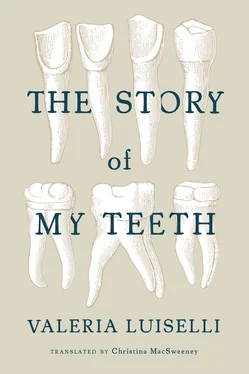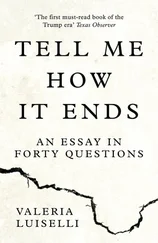Easy: Gustav Mahler.
Good, good. Another:
Sagittarius. She was a feminist born in Hamburg in 1868.
Is that all the information?
Yes, sorry.
I don’t know.
It’s Lida Gustava Heymann. I’ll give you one last one:
Cancer, Cancer ascendant. An astrological disaster. Lover and possible husband of Gustav Mahler’s wife. He was a symbolist painter prone to cluster migraines and erotic expression.
Gustav Klimt?
Correct.
Amusing, he said. But how do you auction the names?
I just do. What auctioneers auction, in the end, are just names of people, and maybe words. All I do is give them new content.
Explain?
You see, I’m like those people who scavenge in your garbage. But with pedigree. I expurgate; I find. I aromatize, clean, and disinfect. I recycle.
Young Jacobo de Voragine stared at his, as yet untouched, cup of Nescafé. He picked up the dispenser, tipped a disgusting quantity of sugar into the cup, and, using his pencil, stirred the coffee in a desultory fashion.
Let’s see. Read me what you’re writing now, I said, trying to keep the conversation alive.
But it’s nothing special, just a description of a corner.
I remained silent, waiting for him to begin. The young man hesitated for a moment, but then opened his notebook, cleared his throat, and read:
There’s a hardware store opposite the house I’ve moved into. I can see it from the window of the bathroom on the roof, the only place where I can smoke in silence. Every afternoon, while the men who serve in the hardware store are beginning to close up, the owner, a senile man, takes a folding chair out onto the sidewalk and starts sharpening the ends of the tacks that he has in a toolbox next to the leg of the chair. One by one, he sharpens them carefully on the curbside, and then throws them into the street. The ritual lasts no more than ten minutes. I flick my cigarette into the toilet and he folds up his chair.
That’s as far as I’ve got, he said, with a look that begged for approval.
It’s tender, I said.
Thanks.
And you have nice, small handwriting.
Thanks.
But it’s all wrong.
Why, sir?
It’s about Mr. Alfonso Reyes’s hardware store, right? La Higuera. The one on the corner of Durango and Morelos.
How could you tell?
Ah, little bird, that’s a long story. But the point is that your description is inaccurate, because Mr. Alfonso is not gaga and neither is he sharpening those tacks. He blunts them. He blunts the ones that are a bit bent, and, when they’re properly blunt, he throws them into the street so that they don’t burst tires or bugger up cars.
And why doesn’t he throw them in the trash?
Because they rip the bags.
I see.
Look Jacobo, Voragine, young Jacobo Voragine, I think I can help you if you help me. You know, you scratch my back, I’ll scratch yours.
I’m not sure if I can help you, sir; I’m not good for much. But go on.
I need to recover my dignities — my teeth, that is — because I can’t recycle anything without them, let alone eat or speak like a human being. And you lack money, time, freedom, peace, work experience, street life, women, stimulants, and everything you surely need for your masterpieces.
That’s true, sir.
But you can’t have any of that. You can’t, because you commute two hours every day to grimy downtown Mexico City, where you work for some son of a bitch who exploits you, and you go back to your apartment, where other young men like you live — all dressed up just as strangely — and the house is a pigsty, so you start washing the dishes, sweeping up the hairballs on the floor, folding T-shirts, hanging up odd socks. You make yourself a sandwich with just cheese, because the ham has all gone snotty green, and by the end of the day, you’re so tired and depressed that you’ve lost the will to sit down and do the one thing you love.
I’m speechless, Mr. Highway. How did you know about the hairballs?
I’m no babe in arms.
So I see. But I still don’t understand what you’re getting at, sir.
That you become a real artist.
And how do you suggest I do that? he asked, in an almost crotchety voice, straightening his hat.
That’s where I come in. I can give you a lot of things, like free lodging, for example. An artist needs free lodging. I have a mansion in Calle Disneylandia, with the best collection of objects that’s ever been seen. And don’t go thinking I’m some sort of degenerate like Michael Jackson. I like ladies my own age.
Free lodging? And what else?
I can give you an education.
Such as?
Such as how to avoid paying for your meals, or how to ride buses for free. I can also give you street. I know this neighborhood better than anyone, and I can give you all that knowledge. This is how it will work: I tell you the story of every corner; I introduce you to my contacts; I take you under my wing, as they say. In time, when you really know this place, you can open your own tourist business here. End of story.
And where do I find the tourists?
They’ll come on their own. The important thing is to tell stories about the neighborhood. As soon as you’ve got those, there’ll be people flocking to hear them. Places and things are made up of stories.
I’m not so sure about that.
Isn’t telling stories what you do?
Yes.
Well, have a bit of faith, won’t you?
Let’s suppose you’re right. That I say yes to your proposal. What are you going to ask me to do in return?
Almost nothing. You just write for me.
Write what?
Whatever I commission you to do. First I need you to write my story, the story of my teeth. I tell it to you, you just write it. We sell millions, and I get my teeth fixed for good. Then, when I die, you write about that too. Because a man’s story is never complete until he dies. End of that task.
And what else?
Well, then, if we rub along well together, I can offer you other jobs.
Such as?
Such as, I need someone to catalog my collection of collectibles, because I auction only my own collections now. I’ve got the world’s best collection. And as I haven’t got much longer in this world, I want to hold a grand auction, for which I need a catalog. But let’s not jump the gun. For the time being, you just write my dental autobiography.
The melancholy young Voragine finally smiled, but he made no reply.
What are you smiling at?
Nothing. That it would be your biography, not your autobiography.
Ah! I see that you’re going to be a good writer too.
Why do you say that?
Because when you smile, you don’t show your teeth. Real writers never show their teeth. Charlatans, in contrast, flash that sinister crescent when they smile. Check it out. Find photos of all the writers you respect, and you’ll see that their teeth remain a permanently occult mystery. I believe the only exception is the Argentinian Jorge Francisco Isidoro Luis.
Borges?
The selfsame. Blind and Argentinian. But he doesn’t count because he was blind, so he probably couldn’t picture himself smiling — at least, not with the smile he had when he was blind, if you know what I mean.
Borges is my idol. Have you read him? asked young Voragine with childlike enthusiasm.
Not as much as I will in the future, I replied.
I think you and I are going to rub along well, Mr. Highway. And I’d be happy to write your biography.
It is my autobiography, you stubborn matchstick, because it is my story, and I will tell it, you’ll just transcribe.
As you wish, sir. I’d be happy to write your dental autobiography.
That’s more like it.
We spent the rest of the morning ordering Nescafés, exchanging stories, and fine-tuning the details of our arrangement. Around noon, the summer sun began to warm the concrete floor of the café. The Nescafés had us as perky as a couple of protococaine addicts, and the Chinese fortune cookies were all gone.
Читать дальше












